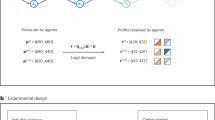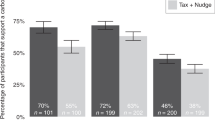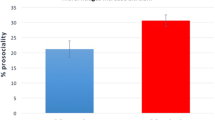Abstract
To measure how moral behaviour interacts with pricing regimes, we conduct highly controlled experiments in which trading creates pollution. We compare indirect pricing (here, a cap and trade mechanism) and direct pricing (a tax) in an otherwise equivalent setting in which ‘producers’ are incentivized to emit CO2. ‘Judges’ decide on central trading parameters that may restrict socially harmful activities. Profit maximization predicts the same producer behaviour in either setting in the absence of regulation, yet we find a substantial share of producers refraining from emitting CO2 at all. Although judges restrict behaviour in similar ways across mechanisms, direct pricing more effectively accommodates moral behaviour than the quantity policy.
This is a preview of subscription content, access via your institution
Access options
Access Nature and 54 other Nature Portfolio journals
Get Nature+, our best-value online-access subscription
$29.99 / 30 days
cancel any time
Subscribe to this journal
Receive 12 digital issues and online access to articles
$119.00 per year
only $9.92 per issue
Buy this article
- Purchase on Springer Link
- Instant access to full article PDF
Prices may be subject to local taxes which are calculated during checkout



Similar content being viewed by others
Data availability
All data reported in this paper are available in the Supplementary Information.
Code availability
The data was analysed with the software Stata. A Stata do-file that allows for the replication of the analyses reported in our paper is available for download together with our dataset.
References
Falk, A. & Szech, N. Morals and markets. Science 340, 707–711 (2013).
Bartling, B., Weber, R. A. & Yao, L. Do markets erode social responsibility? Q. J. Econ. 130, 219–266 (2015).
Kirchler, M., Huber, J., Stefan, M. & Sutter, M. Market design and moral behavior. Manag. Sci. 62, 2615–2625 (2015).
Sutter, M., Huber, J., Kirchler, M., Stefan, M. & Walzl, M. Where to look for the morals in markets? Exp. Econ. 23, 30–52 (2020).
Page, E. A. Cashing in on climate change: political theory and global emissions trading. Crit. Rev. Int. Soc. Polit. Philos. 14, 259–279 (2011).
Sandel, M. J. What Money Can’t Buy: The Moral Limits of Markets (Farrar, Strauss and Giroux, 2012).
Ostrom, E. Coping with tragedies of the commons. Annu. Rev. Polit. Sci. 2, 493–535 (1999).
Duranton, G. & Turner, M. A. The fundamental law of road congestion: evidence from US cities. Am. Econ. Rev. 101, 2616–2652 (2011).
Friesen, L. & Gangadharan, L. Environmental markets: what do we learn from the lab? J. Econ. Surv. 27, 515–535 (2013).
Plott, C. R. Externalities and corrective policies in experimental markets. Econ. J. 93, 106–127 (1983).
Sapci, O., Wood, A. D., Shogren, J. F. & Green, J. F. Can verifiable information cut through the noise about climate protection? An experimental auction test. Climatic Change 134, 87–99 (2016).
Jakob, M., Kübler, D., Steckel, J. C. & van Veldhuizen, R. Clean up your own mess: an experimental study of moral responsibility and efficiency. J. Public Econ. 155, 138–146 (2017).
Löschel, A., Sturm, B. & Vogt, C. The demand for climate protection—empirical evidence from Germany. Econ. Lett. 118, 415–418 (2013).
Diederich, J. & Goeschl, T. Willingness to pay for voluntary climate action and its determinants: field-experimental evidence. Environ. Resour. Econ. 57, 405–429 (2014).
Diederich, J. & Goeschl, T. To mitigate or not to mitigate: the price elasticity of pro-environmental behavior. J. Environ. Econ. Manag. 84, 209–222 (2017).
Löschel, A., Sturm, B. & Uehleke, R. Revealed preferences for voluntary climate change mitigation when the purely individual perspective is relaxed – evidence from a framed field experiment. J. Behav. Exp. Econ. 67, 149–160 (2017).
Lohse, J., Goeschl, T. & Diederich, J. H. Giving is a question of time: Response times and contributions to an environmental public good. Environ. Resour. Econ. 67, 455–477 (2017).
Pigou, A. C. The Economics of Welfare (Macmillan, 1920).
Coase, R. H. The problem of social cost. J. Law Econ. 3, 1–44 (1960).
Stavins, R. N. in The New Palgrave Dictionary of Economics 2nd edn (eds Durlauf, S. & Blume, L. E.) 1778–1788 (Palgrave Macmillan, 2008).
Klenert, D. et al. Making carbon pricing work for citizens. Nat. Clim. Change 8, 669–677 (2018).
Goulder, L. H. & Schein, A. R. Carbon taxes versus cap and trade: a critical review. Clim. Change Econ. 04, 1350011–1350028 (2013).
Chichilnisky, G. & Heal, G. Who should abate carbon emissions? An international viewpoint. Econ. Lett. 44, 443–449 (1994).
Weitzman, M. L. Prices vs. quantities. Rev. Econ. Stud. 41, 477–491 (1974).
Fuss, S. et al. A framework for assessing the performance of cap-and-trade systems: insights from the european union emissions trading system. Rev. Environ. Econ. Policy 12, 220–241 (2018).
MacKay, D., Cramton, P., Ockenfels, A. & Stoft, S. Price carbon — I will if you will. Nature 526, 315–316 (2015).
Weitzman, M. L. in Global Carbon Pricing: The Path to Climate Cooperation (eds Cramton, P. et al.) Ch. 8 (MIT Press, 2017).
Cramton, P., Ockenfels, A. & Tirole, J. Policy brief—translating the collective climate goal into a common climate commitment. Rev. Environ. Econ. Policy 11, 165–171 (2017).
Kornek, U. & Edenhofer, O. The strategic dimension of financing global public goods. Eur. Econ. Rev. https://doi.org/10.1016/j.euroecorev.2020.103423 (2020).
Nordhaus, W. D. To tax or not to tax: alternative approaches to slowing global warming. Rev. Environ. Econ. Policy 1, 26–44 (2007).
Cramton, P., Ockenfels, A. & Stoft, S. in Global Carbon Pricing: The Path to Climate Cooperation (eds Cramton, P. et al.) Ch. 12 (MIT Press, 2017).
Stavins, R. N. The Future of U.S. Carbon-Pricing Policy. Environ. Energy Policy Econ. 1, 8–64 (2020).
Krishna, V. Auction Theory (Elsevier, 2002).
Becker, G. M., Degroot, M. H. & Marschak, J. Measuring utility by a single-response sequential method. Behav. Sci. 9, 226–232 (1964).
Fehr, E. & Schmidt, K. M. A theory of fairness, competition, and cooperation. Q. J. Econ. 114, 817–868 (1999).
Bolton, G. E. & Ockenfels, A. ERC: a theory of equity, reciprocity, and competition. Am. Econ. Rev. 90, 166–193 (2000).
Gollier, C. & Tirole, J. Negotiating effective institutions against climate change. Econ. Energy Environ. Policy 4, 5–28 (2015).
Acknowledgements
We thank conference and seminar participants in Berlin, Cologne, Mannheim and Paderborn for valuable comments and suggestions. We thank L. Jung for excellent research assistance. Financial support of the German Research Foundation for the experiment through the research unit ‘Design & Behavior’ (FOR 1371) is acknowledged. This project also received support from the European Research Council (ERC) under the European Union’s Horizon 2020 research and innovation programme (grant agreement no. 741409; the results reflect the authors’ views and the ERC is not responsible for any use that may be made of the information it contains) and from the Deutsche Forschungsgemeinschaft (DFG, German Research Foundation) under Germany’s Excellence Strategy – EXC 2126/1– 390838866.
Author information
Authors and Affiliations
Contributions
A.O. devised the project. A.O. and P.W. designed the experiment with support from O.E. P.W. carried out the experiment, performed the numerical simulations and conducted the statistical tests with support from A.O., and all authors wrote the manuscript.
Corresponding author
Ethics declarations
Competing interests
The authors declare no competing interests.
Additional information
Publisher’s note Springer Nature remains neutral with regard to jurisdictional claims in published maps and institutional affiliations.
Supplementary information
Supplementary Information
Supplementary Tables 1–5, discussion, methods and references.
Supplementary Data 1
Experiment data from participants in the role of judges.
Supplementary Data 2
List and description of variables included in the dataset OWE_Data_Judges_Experiment.dta.
Supplementary Data 3
Experiment data from participants in the role of producers.
Supplementary Data 4
List and description of variables included in the dataset OWE_Data_Producers_Experiment.dta.
Supplementary Data 5
Data from the simulated market outcomes.
Supplementary Data 6
List and description of variables included in the dataset OWE_Data_Simulations_Markets.dta.
Supplementary Data 7
Stata do-file that performs all analyses on the experiment data and simulation data as reported in the paper.
Supplementary Data 8
Read-me file that describes the supplementary data files.
Rights and permissions
About this article
Cite this article
Ockenfels, A., Werner, P. & Edenhofer, O. Pricing externalities and moral behaviour. Nat Sustain 3, 872–877 (2020). https://doi.org/10.1038/s41893-020-0554-1
Received:
Accepted:
Published:
Issue Date:
DOI: https://doi.org/10.1038/s41893-020-0554-1
This article is cited by
-
Pigou in the 21st Century: a tribute on the occasion of the 100th anniversary of the publication of The Economics of Welfare
International Tax and Public Finance (2021)



